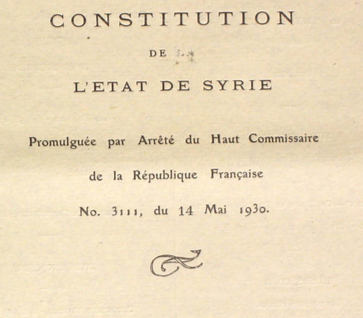In December, the Sunni Islamist Hayat Tahrir al-Sham (HTS) took over Syria in an internationally-backed offensive. HTS was formerly known as Jabhat al-Nusra, and al-Qaeda in Iraq (AQI) before that. Today, their leader Ahmed al-Sharaa (formerly known as Abu Mohammad al-Jolani) signed a new declaration of an interim constitution.
The actual constitution doesn’t appear to be totally written at this point, interestingly enough, despite being made law of the land. There is a seven person committee appointed by the HTS to draft it, with the stipulation that the country will be placed under Islamist rule for the next five years, ahead of another future final constitution going into effect.
The declaration places certain conditions on the constitution, including a requirement that the president of Syria must always be a Muslim and that Islamic Law will be the main source of jurisprudence.

The 1930 constitution of the First Syrian Republic
The council is made up of Sharaa, the interim foreign, interior, defense ministers, and the head of the intelligence agency, along with two legal experts.
Abdulhamid Al-Awak, a constitutional law expert and professor in Turkey, was installed as one of the members of the constitutional committee. He has said that the constitution, despite being Islamist in nature, will enshrine freedom of the press and freedom of expression. It will also reportedly retain terms from the previous Assad-era constitution guaranteeing women the right to work and participate in the economy.
Previous comments from the HTS-dominated committee members are that Syria will have no system of federalism, and that power will be consolidated under the national government. Federalism is seen as an option to protect religious and ethnic minorities within Syria.
Last week’s massacre of Alawites by the HTS in northwestern Syria have put a lot of the country’s religious minorities on edge. A new explicitly Islamist constitution is probably only going to add to those concerns, and the HTS goal of unity under central government control looks a long way off.


